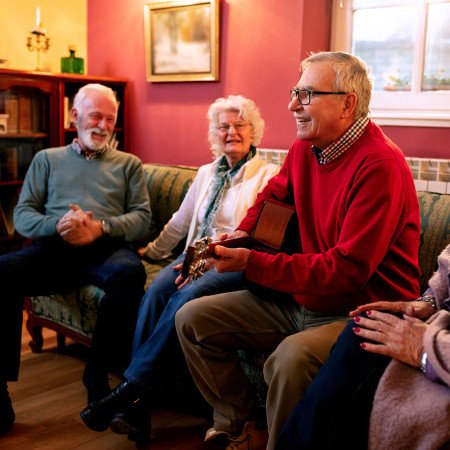Safeguarding training policy and practice guidance
 People sitting and talking" />
People sitting and talking" />  People sitting and talking" />
People sitting and talking" />
The Parochial Church Council (PCC) and the Incumbent are responsible for ensuring that all church officers are trained appropriately for their roles.
To assist with the creation of a safeguarding culture each PCC (or equivalent charitable body) must ensure that all church officers* who work with children, young people and/or vulnerable adults attend diocesan safeguarding training at least every three years. [this] will be checked during parish visitations.
In accordance with the Church of England Safeguarding Policy the Parish will safely recruit, train and support all those with any responsibility for children, young people and adults to have the confidence and skills to recognise and respond to abuse.
In terms of safeguarding, with the incumbent the PCC will:
- Promote a safer church for all in the church community, and ensure there is a plan in place to raise awareness of, promote training and ensure that safeguarding is taken seriously by all those in the church community;
- Ensure that all church officers* who work with children, young people and/or vulnerable adults attend diocesan safeguarding training at least every three years.
Church of England Key Roles and Responsibilities of Church Office Holders and Bodies Practice Guidance
*A “church officer” is anyone appointed/elected by or on behalf of the Church to a post or role, whether they are ordained or lay, paid or unpaid, for example a priest, church warden, bell ringer, organist or youth group leader.
As the law currently stands all relevant persons must have due regard to guidance issued by the House of Bishops on matters relating to the safeguarding of children and vulnerable adults.
Relevant persons are:
- A clerk in Holy Orders who is authorised to officiate in accordance with the Canons of the Church of England.
- A diocesan, suffragan, or assistant bishop.
- An archdeacon.
- A person who is licensed to exercise the office of reader or serve as a lay worker.
- A churchwarden.
- A parochial church council.
What are the sanctions for those who do not follow ‘due regard’ to the safeguarding policy and practice guidance issued by the House of Bishops?
A failure by a member of the clergy to comply with the duty to have due regard to House of Bishops safeguarding guidance is misconduct under the Clergy Discipline Measure 2003 (‘CDM’). Were proceedings under the CDM to involve an allegation of failing to have due regard to the guidance, the onus would be on the member of clergy concerned to establish that he or she had cogent reasons for not following the guidance. A disciplinary tribunal would be likely to scrutinise the reasons given with great care to test whether they were in fact clear, logical and convincing.
A failure by a reader or lay worker to have due regard to House of Bishops safeguarding guidance would be grounds for the revocation of the reader’s or lay worker’s licence by the bishop.
A failure by a churchwarden or parochial church council to have due regard to House of Bishops safeguarding could result in an investigation being carried out by the Charity Commission and the churchwarden or PCC members being disqualified as charity trustees.
All office holders are expected to participate in safeguarding and refresher training. Failure to do so may give rise to disciplinary action under the Clergy Discipline Measure - Diocese of Chelmsford: A Handbook for Ecclesiastical Office Holders
The clergy are required to have appropriate and current training in safeguarding children and vulnerable adults. Failure to participate may result in action being taken under the Clergy Discipline Measure - Church of England: Guidelines for the Professional Conduct of the Clergy
Ministry in retirement is subject to the bishop granting a Licence or Permission to Officiate, and subject to the completion of safeguarding training - Church of England: Guidelines for the Professional Conduct of the Clergy
The Ecclesiastical Insurance Group has made it clear that their insurance cover is only valid where House of Bishops’ safeguarding policy and practice guidance is being followed.
For more information or to report anything wrong with this page please contact The Safeguarding team
- Contact the Diocesan Safeguarding Team
- Contact info for Safeguarding Organisations, Charities & Local Authorities
- Safeguarding Guidance and Resources
- Safeguarding Training
- What Safeguarding courses am I required to do?
- e-Learning (online) safeguarding courses
- Leadership Safeguarding Training
- PSO (Parish Safeguarding Officer) Induction
- Safeguarding training policy and practice guidance
- Virtual (via Zoom) safeguarding course FAQs
- DBS Guidance & FAQs
- thirtyone:eight
- DBS Update Service & online Status Checks
- Overseas Criminal Record Checks

 People sitting and talking" />
People sitting and talking" />  People sitting and talking" />
People sitting and talking" />